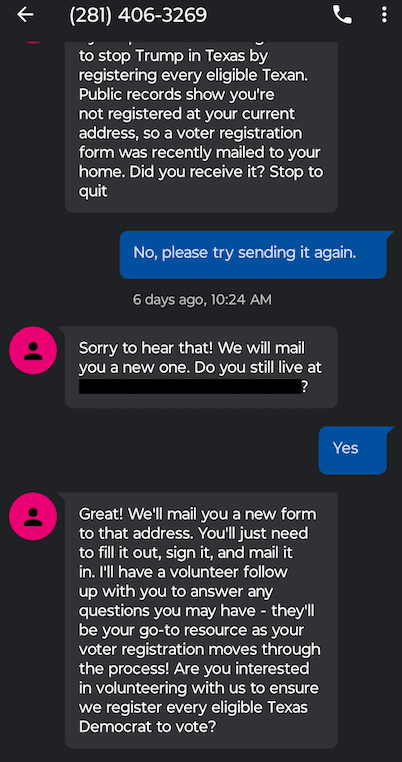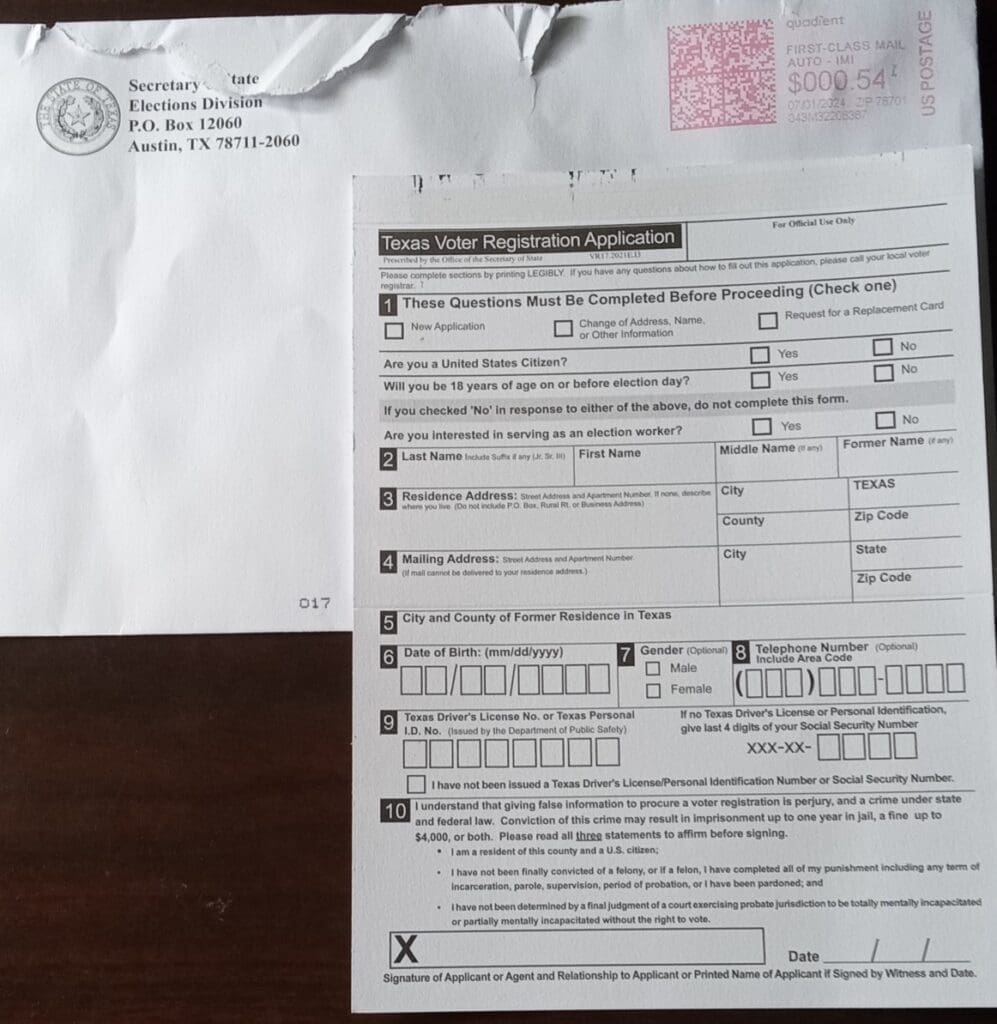Powered By People, a Democrat political action committee, has found a loophole in the Secretary of State’s website allowing it to send unlimited, unsolicited voter applications to its targets at the taxpayers’ expense.
In a text exchange obtained by Texas Scorecard, “Dan” claimed “a voter registration form was recently mailed to your home.”
After learning the form had not arrived, the next day “Dan” stated, “We’ll mail you a new form to that address.”


Shortly after, the Secretary of State’s office sent a postage-paid envelope to the address.

This interaction raised ethical concerns: If Powered By People (PXP) requested the form before the text conversation transpired, it did so without permission from its intended recipient. However, if PXP requested the form after the text conversation, it used deceptive practices and pretexting (a form of social engineering) to obtain consent for this request.
This pattern of behavior became public knowledge when Attorney General Ken Paxton issued PXP a warning in 2021, saying it “deceptively” offered vaccine information.
The following day, PXP sent an envelope with a return address showing an Austin post office box linked to the Beto for Texas campaign.
Although Robert “Beto” O’Rourke’s campaign website currently features a Houston-based PO Box, he still appears prominently on the PAC’s What We Do and Volunteer pages. These two pages and the privacy policy even direct potential volunteers to info@betoorourke.com.
Yet PXP’s disclaimer at the bottom of every webpage reads: “POL ADV PAID FOR BY POWERED BY PEOPLE, POWEREDXPEOPLE.ORG, NOT AUTHORIZED BY ANY CANDIDATE OR CANDIDATE’S COMMITTEE.” It shows a PO Box mailing address for MBA Consulting Group, a campaign consultant in Washington, DC.
Contradicting PXP’s disclaimer, “Dan” stated via text, “We request voter registration forms be sent from the Texas Secretary of State.”
This confirmed that the organization either requested an unsolicited voter registration or used pretexting to deceptively obtain request permission from a potential voter, all while using taxpayer dollars to fund its voter registration drive scheme.
Christine Welborn, president of Advancing Integrity, said, “That’s an issue for me. If you’re a third party and want to send them out, great, but you shouldn’t be using taxpayer dollars.”
“If they’re doing it, they’re probably not the only group doing it on the left,” commented Devvie Duke, a former State Republican Executive Committeewoman and Republican Party of Texas Chair of the Election Integrity Committee.
While the election code authorizes the SOS to send registration by mail with postage paid for by the state at a new voter’s request, a webpage titled Request for Postage-Paid Voter Registration Form on the Secretary of State’s website allows this vulnerability of third parties requesting the registration.
Any person may request up to five Voter Registration Application forms at a time from the SOS and send them to anybody, with no limits on the number of reorders or new orders.
Although a prior page states “You may request a postage-paid application by filling out this form so that a voter registration application can be mailed to you,” nothing requires that the requester be the same person as the recipient.
The only election laws preventing third-party solicitation and distribution of forms apply to vote-by-mail applications.
Notably, the form PXP ordered from the SOS had the county registrar’s return address. The form sent directly from PXP had the SOS’s return address. This indicated that PXP used the Request for Postage-Paid Voter Registration Form webpage to mail out the SOS envelope.
When asked when and which IP address ordered the voter registration application form, the SOS legal counsel wrote, “We do not maintain any information responsive to your request.”
“I don’t know of anybody on the right doing this, because I question the legality of it. And it’s definitely not ethical. How are they getting these EBU [eligible but unregistered voter] lists?” said Devvie Duke.
“I would like to know where they are getting their information,” Christine Welborn agreed.
In addition to deceptive text and mail practices, PXP’s website offers 45-minute Zoom calls for training Volunteer Deputy Registrars. Its site claims, “You must first get certified as a Volunteer Deputy Registrar (VDR) by taking a short training with us.”
The election code, however, explicitly requires a county registrar to appoint and train potential volunteers, not third parties.
(Although some Texas counties offer online reciprocity options for VDR certification—the Democrat Party even provides a spreadsheet of participating counties on its website—one still needs a VDR certification before making any such request.)
“Is the county just accepting if people go to this training class that they’re automatically just counting them like ‘Oh they did the training,’ or are they present and making sure that the training is being done properly?” Welborn asked.
To find out, Texas Scorecard attended a Zoom training hosted by PXP.
The training is straightforward. One watches a 30-minute video by Travis County Elections, then takes a 25-question multiple choice test and completes a certification information form. These last two links also prominently feature O’Rourke in the URL redirecting to a Microsoft form.
Travis County Voter Registration Division Director Christopher Davis reviews the test results and verifies or corrects certification forms before mailing them to participants. Afterward, one can request reciprocity from one’s home county and other counties using this form.

The host, Ann-Marie Coyne, explained when asked that PXP can order forms from the SOS for other people, “We do order forms through the texting team for people.” She also said, “Whether you’re in Texas or not, you can help us with that,” which confirmed that people from out-of-state can order forms for Texans at taxpayers’ expense.
Welborn suggested that the SOS site use “Some kind of checkbox like ‘I’m requesting this for myself or my family,’ something like that. Or just some kind of language that says, ‘This is for the purpose of requesting something for yourself or family member, not for mass use.’”
No ads. No paywalls. No government grants. No corporate masters.
Just real news for real Texans.
Support Texas Scorecard to keep it that way!





